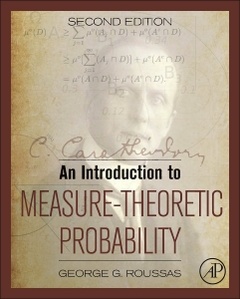An Introduction to Measure-Theoretic Probability (2nd Ed.)
Auteur : Roussas George G.

An Introduction to Measure-Theoretic Probability, Second Edition, employs a classical approach to teaching the basics of measure theoretic probability. This book provides in a concise, yet detailed way, the bulk of the probabilistic tools that a student working toward an advanced degree in statistics, probability and other related areas should be equipped with.
This edition requires no prior knowledge of measure theory, covers all its topics in great detail, and includes one chapter on the basics of ergodic theory and one chapter on two cases of statistical estimation. Topics range from the basic properties of a measure to modes of convergence of a sequence of random variables and their relationships; the integral of a random variable and its basic properties; standard convergence theorems; standard moment and probability inequalities; the Hahn-Jordan Decomposition Theorem; the Lebesgue Decomposition T; conditional expectation and conditional probability; theory of characteristic functions; sequences of independent random variables; and ergodic theory. There is a considerable bend toward the way probability is actually used in statistical research, finance, and other academic and nonacademic applied pursuits. Extensive exercises and practical examples are included, and all proofs are presented in full detail. Complete and detailed solutions to all exercises are available to the instructors on the book companion site.
This text will be a valuable resource for graduate students primarily in statistics, mathematics, electrical and computer engineering or other information sciences, as well as for those in mathematical economics/finance in the departments of economics.
- Provides in a concise, yet detailed way, the bulk of probabilistic tools essential to a student working toward an advanced degree in statistics, probability, and other related fields
- Includes extensive exercises and practical examples to make complex ideas of advanced probability accessible to graduate students in statistics, probability, and related fields
- All proofs presented in full detail and complete and detailed solutions to all exercises are available to the instructors on book companion site
- Considerable bend toward the way probability is used in statistics in non-mathematical settings in academic, research and corporate/finance pursuits
Date de parution : 04-2014
Ouvrage de 426 p.
19x23.3 cm
Mots-clés :
Additive constant; Additivity; Argument; Asymptotic; Auxiliary results; Bandwidth; Binomials; Borel real line; Borel-Cantelli Theorem; Cantor diagonal method; Cardinality; Cartesian product; Cauchy criterion; Central limit theorem; Complementation; Constant; Convergence theorem; Convex function; Convexity; Coordinate process; Correlation coefficient; Countable operations; Countable unions; Covariance; Covention; Decomposition; Delta method; Derivatives; Differentiation; Discontinuity points; Double exponential; Elementary definition; Ergodicity; Euclidean distance; Events; Extension; Factorization; Finite number; Finite variations; Finiteness; Fubini theorem; Fundamental Theorem; Grouping; Helly-Bray type; Indefinite integral; Independent classes; Indicator function; Induction hypothesis; Induction method; Inequalities; Integrands; Integration; Intersection reformulation; Invariance; Inversion formula; Jensen Inequality; Kernel method; Kolmogorov inequalities; Lebesgue measure; Lebesgue sense; Limiting distribution; Logarithm; Measurable mapping; Measurable sets; Mode; Moment; Monotone class; Mutual convergence; Noncentered case; Nonnegative function; Nonparametric estimation; Nonrestrictive assumption; Notation; Notational convenience; Null set; Open interval; Pairwise disjoint; Partial sums; Partition; Probability measure; Probability sense; Product space; Ramification; Ramifications; Random vector; Rationals; Regularity conditions; Reindexing; Riemann-Stieltjes sense; Robustness; Sample mean; Shift transformation; Signed measure; Singletons; Slutsky's theorem; Stationarity; Statistical inference; Step function; Stochastic; Subsequence; Subsets; Suffices; Summation; Taylor's theorem; Tchebichev inequality; Toeplitz Lemma; Triangular arrays; Trivial field; Union



